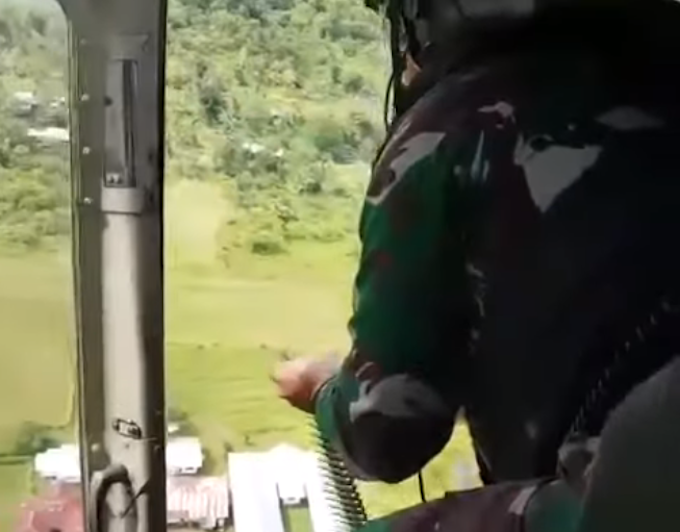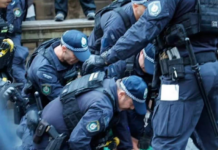
OPINION: By Dwi Atmanta in Jakarta
After nearly 18 years of reform, public recognition of the Indonesian Military (TNI) as both defender of the state and a choice for national leadership has barely changed, although the once mighty force has stepped away from practical politics.
Candidates with military backgrounds have marked political contestation ever since democratic elections were held in 1999. Many still believe Indonesia needs the guardianship of military figures, as civilian politicians are often perceived to be unprepared to lead the nation in the face of global challenges.
After 10 years under Susilo Bambang Yudhoyono, once billed as a reform-minded Army general, Indonesians almost put their trust in another general, Prabowo Subianto, in the 2014 election.
Prabowo eventually lost the race to up-and-coming local politician Joko “Jokowi” Widodo, but clearly the public psyche of looking to a leader with a military background remains alive.
A recent national survey of 1225 eligible voters in all 34 provinces between January 4-15 by an organisation called the Segitiga Institute found that the current TNI chief, General Gatot Nurmantyo, could be a serious contender for president against incumbent Jokowi if the two were to go head-to-head in the 2019 election.
Previously, the more prominent polling organisation Saiful Mujani Research and Consulting (SMRC) discovered in its survey that the TNI was considered the country’s most credible institution, eclipsing the President, the Corruption Eradication Commission (KPK), the National Police and the nation’s political parties.
The majority of some 1200 respondents surveyed chose the TNI, identifying them with peace and stability, SMRC executive director Djayadi Hanan said.
We may argue with the validity of those findings but nevertheless, many seem to dream of a president with a military background for various reasons. Reformasi has stripped the military of its political powers, but definitely not its influence.
Civilian supremacy
The military has accepted the principle of civilian supremacy. But supremacy has turned into inferiority, as evidenced by the reluctance of the civilian regime to make the military fully committed to the universal rights that characterise democracy.
Look at cases of gross human rights violations that dragged a number of Army generals to the ad hoc human rights court. All the officers on trial were acquitted, despite mounting pressures to end impunity.
A much-awaited formal investigation into alleged atrocities committed in the aftermath of the September 30, 1965, aborted coup blamed on the communists looks unlikely to materialise, although the National Commission on Human Rights (Komnas HAM) has submitted its report to the Attorney-General’s Office.
In countering the demand for justice from victims and families of the 1965 tragedy, active and retired generals have repeatedly warned of “a communist resurrection”.
Even the Defence Ministry launched last year a state defence program in which civilians — including students, workers, government employees and taxi drivers — undergo a month-long military-style training program to strengthen patriotism and fight “foreign ideologies”, including communism.
Painstaking efforts to amend a law to bring military soldiers accused of ordinary crimes to civil courts have so far failed. Military resistance has stood in the way of revising the Military Tribunal Law.
The system has also kept the military safe from the radar of law enforcement institutions like the KPK, although the defence sector is highly prone to corruption because of the huge amount of money involved.
High corruption risk
In its latest survey, the global watchdog Transparency International placed Indonesia among countries with a high risk of corruption in arms procurement due to a lack of transparency and accountability.
The TNI’s absence from practical politics is by no means a setback for the military. Instead, the move away from practical politics has allowed the military to avoid corruption investigations and the protracted bickering that has tainted lawmakers as well as their political parties.
History reveals much about why the public still longs for military figures to lead the nation. The TNI typifies the characteristics of what some scholars define as a “political army”. The TNI has been involved in and has developed a close connection with all stages of the evolution of the country, similar to military regimes in other developing nations.
Since the birth of this nation, either in war or peace, the TNI has never lost its relevance. It is this historical presence that has made it unlikely, for instance, for Indonesia to promote national reconciliation, despite demands for justice for victims, survivors and relatives of 1965.
Each stage of modernisation, or development, leads to an opportunity or the perceived “need” for military political intervention. Development needs stability and the military will fulfill it; and when a crisis happens, the military jumps to the rescue.
Recently the military deployed its personnel to help farmers in many parts of the country support the government’s food sufficiency program.
Not only will the program close the gap between grassroots people and their “protectors”, it will also help the military keep its relevance and credibility intact.
The two surveys carry a stern warning for civilian politicians — they must address their inferiority complex to regain public confidence. With bickering civilian politicians constantly seeking figures in uniform to boost votes, people are left with more credible-looking alternatives, like active or retired officers, regardless of whether or not they have a blood-stained past.












































